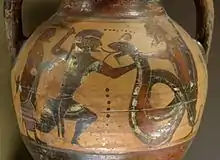Otrera
In Greek mythology, Otrera /oʊˈtrɪərə, -ˈtriːrə/ (Ancient Greek: Ὀτρήρη Otrērē) was the creator and first queen of the Amazons. She was the alleged daughter of Eurus (the east wind), consort of Ares, and mother of Hippolyta, Antiope, Melanippe, and Penthesilea.[1][2][3] She is credited with being the founder of the shrine of Artemis in Ephesus.
| Greek mythology |
|---|
 |
| Deities |
| Heroes and heroism |
| Related |
|
|
|
Mythology
Otrera was the creator of the Amazon Nation, an empire of warrior women dedicated to Ares (the god of war) and Artemis (the goddess of the moon and archery) She is also considered to be the mythological founder of the Temple of Artemis in Ephesus. Otrera and her people were warlike women whose skills in battle were not matched by any man.[4][5] [6]
She was possibly the unknown Amazon who was slain by Bellerophon in Lycia, but more likely was not.[7]
Creation of the Amazons
Otrera was born north of modern-day Greece, parentage unknown. She was originally a housewife during the Bronze age in an arranged marriage. She was treated horribly by her husband and decided to train herself in secret and learn how to defend herself with a sword and a bow and arrow. Once confident in her abilities, she began to teach the housewives in her town to fight. Otrera taught the other women the hunting skills of Artemis, but they also prayed to Ares for strength.[8] One day, Otrera and her women rebelled and took over the entire town and eventually the surrounding towns. Otrera and her women would march into neighboring towns, liberate the women, and then slaughter and enslave the men. Otrera fled the country with her people and founded the capital city Sinope, where she trained her armies and gathered recruits while gradually expanding her territory. Otrera and her people became known as the Amazons. This name possibly derives from the Greek word amazos, which means without a breast due to the rumor that the Amazons would remove their right breasts so they could more effectively fire an arrow or throw a spear. Another theory about the origin of their name is that the word Amazon derives from the Persian word "Ha'mazan", or "Warrior Women"[9]
Otrera and Ares
Otrera attracted the attention of the god Ares through acts of war and praise for the god. Ares came down from Olympus and told Otrera to build him a temple surrounding a big rock that he made fall from the sky. Ares told Otrera to bring her Amazons to the temple every year and sacrifice their most important animals, and in return he would continue to bless them in battle.[10][11]
Ares continued to love Otrera, and she was known as the bride of Ares. Ares and Otrera would later have two daughters, Hippolyta and Penthesilelia, who would also later on become Amazon queens.
Otrera and the Temple of Artemis
Otrera built the temple for Ares, but she did not want to upset the god Artemis, from whom she had also received blessings, so Otrera decided to build another temple dedicated to Artemis in the city of Ephesus, close enough so that the Greeks could visit. The temple was built on a high hill so that it could be seen from all over. A festival was held every year at this temple, and the Amazons would spend the whole day celebrating and perform war dances through the streets. The people would sacrifice jewelry to Artemis by draping it over her statue. The temple was destroyed and rebuilt twice and became one of the Seven Wonders of the Ancient World.[12][13]
Otrera and Dionysus
Dionysus, the god of wine, was traveling through the mortal world with his followers known as the maenads. While on his way to invade India, he came upon the land of the Amazons. Upon meeting the Amazon scouts, he decided to add them to his group of followers. Otrera heard of his presence and despised the thought of her troops joining his forces, and so she ordered an attack against him. In this battle, Dionysus defeated the Amazons, since he was a god. The remaining Amazons fled to the Temple of Artemis.[14][15]
Notes
- Bibliotheca, Epitome of Book IV, 5. 1
- Hyginus, Fabulae, 30; 112
- "Otrera". www.angelfire.com. Retrieved 2019-12-04.
- Hyginus, Fabulae 223, 225
- Pausanias, Description of Greece 7. 2. 6
- Jessica Amanda Salmonson, The Encyclopedia of Amazons: Women Warriors from Antiquity to the Modern Era (NY: Paragon House, 1991), 118 and 206. ISBN 1557784205, 9781557784209; and Robert E. Bell, Women of Classical Mythology: A Biographical Dictionary (Santa Barbara CA: ABC-CLIO, 1991), 246. ISBN 0874365813, 9780874365818
- "OTRERA - Amazon Queen of Greek Mythology". www.theoi.com. Retrieved 2018-02-26.
- Riordan, Rick, author. (2017). Percy Jackson's Greek heroes. ISBN 978-1-338-18948-3. OCLC 1099797345.CS1 maint: multiple names: authors list (link)
- "6. Skin: Tattooed Amazons", The Amazons, Princeton University Press, 2014-12-31, pp. 95–116, doi:10.1515/9781400865130-009, ISBN 978-1-4008-6513-0
- "Otrera". www.angelfire.com. Retrieved 2019-12-04.
- Riordan, Rick, author. (2017). Percy Jackson's Greek heroes. ISBN 978-1-338-18948-3. OCLC 1099797345.CS1 maint: multiple names: authors list (link)
- Riordan, Rick, author. (2017). Percy Jackson's Greek heroes. ISBN 978-1-338-18948-3. OCLC 1099797345.CS1 maint: multiple names: authors list (link)
- "Temple of Artemis at Ephesus". Ancient History Encyclopedia. Retrieved 2019-12-04.
- "10 Intriguing Stories About The Legendary Amazons". Listverse. 2015-11-14. Retrieved 2019-12-04.
- Riordan, Rick, author. (2017). Percy Jackson's Greek heroes. ISBN 978-1-338-18948-3. OCLC 1099797345.CS1 maint: multiple names: authors list (link)
References
- Grimal, Pierre, The Dictionary of Classical Mythology, Wiley-Blackwell, 1996, ISBN 978-0-631-20102-1. "Hippolyta"
- Hyginus, Fabulae 225
- Smith, William; Dictionary of Greek and Roman Biography and Mythology, London (1873). "Otre'ra" , "Hippo'lyte"
External links
- The Theoi Project, "OTRERA"
- Florence Mary Bennett, Religious Cults Associated with the Amazons: (1912): Chapter III: Ephesian Artemis (text)
- Quintus Smyrnaeus, Posthomerica: (uncertain date, possibly 4th century AD) (text)
| Preceded by unknown |
Queen of the Amazons | Succeeded by Hippolyta |